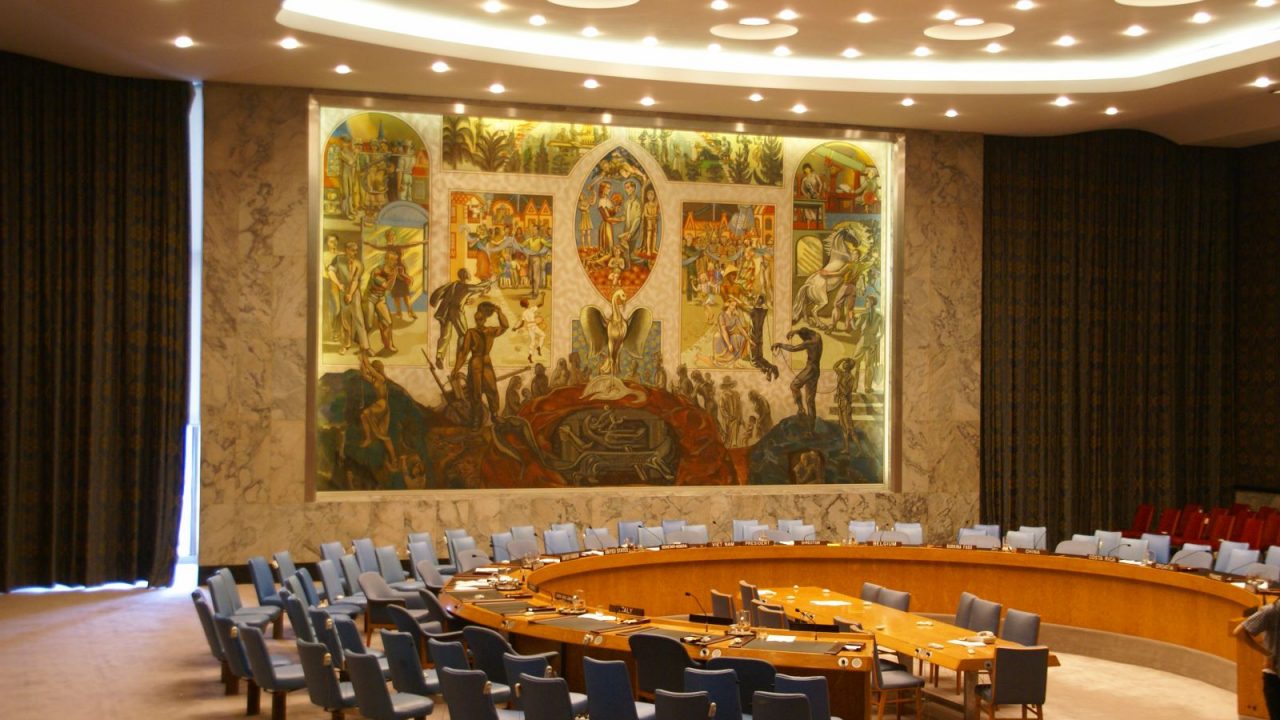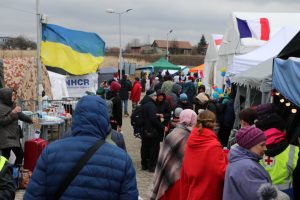
© Shutterstock
Mansoor Dahri, Surrey, UK
The word ‘veto’ means ‘I forbid’ in Latin, whence it originates1. In English, a veto is ‘a decision by a person in authority to not allow or approve something’ e.g. a law or a bill or any other piece of legislation.2 The power to veto legislation is present in a number of legal bodies, e.g., the US Congress or the UN Security council.
The United Nations or UN is an organisation founded in the aftermath of World War II to preserve international peace and harmony.3 It has six principal organs,4 one of which is the UN Security Council.5 According to the UN Charter, the UN Security Council is assigned the primary responsibility for the maintenance of international peace and security.
Who Gets to Use the Veto?
In addition to ten non-permanent members that are rotated biannually, the Security Council has five permanent members, each of which has the power of veto.
The five permanent members of the UN Security Council are China, France, Russia (originally the USSR), the UK and the US6. Each of these five countries can exercise their veto power in any substantive matter.
This means that even if four out of five permanent members and all ten non-permanent members want to pass legislation, they can’t do it if the remaining fifth permanent member vetoes the legislation. In that case, the proposal simply can’t pass.
How is this Fair?
It’s not. It’s undemocratic by definition and there have been calls to have it abolished.7It has been criticised as being old-fashioned and unjustly biased towards one particular region of the world; three of the five permanent members are Western nations (four if you include Russia, which despite its antagonistic relationship with America and American allies, is still technically considered part of Western or at least European civilisation).
So naturally the question arises as to what extent the UN Security Council can maintain global peace when a minority of the globe has majority representation in its ranks.
Why Does the Veto Even Exist then?
When it is clearly unfair and undemocratic, how did it even come into existence? What were the founders of the UN even thinking? According to defenders of the veto, it would be impossible to have a UN Security Council without it; the argument is that major powers like America or Russia would never agree to subject themselves to the authority of an organisation unless they had some guarantee that it wouldn’t go against their best interests.8 And unless the UN has the major powers on board, how can it hope to maintain peace?
Of course, the trouble with this argument is that if the major powers are just going to do what they like, then would that not make the UN somewhat redundant? Why have an international governing body at all if some of its members basically operate under their own set of rules?
When Has it Been Used?
Ever since the USSR cast the first veto on 16th February 1946, there have been 293 vetoes cast by all permanent members in total.9 In the beginning, the USSR cast most of the vetoes, but after the USA cast its first veto on 17th March 1970, it has used the veto far more than any other permanent member of the UN Security Council.
Most frequently, the USA has blocked decisions that it deemed to be against the best interests of Israel.10 For instance, the USA has recently used its veto at least three times (at the time of writing) since the start of Israel’s war on Gaza; all three of these were instances of the USA vetoing resolutions calling for an end to Israel’s horrific treatment of Gaza’s people.11 Despite majority approval in all three cases, the resolutions could not pass because the USA vetoed them.
Where Does that Leave the UN?
All of this has called into question the legitimacy of the UN and its Security Council. Political leaders have called for reform. For instance, Turkish President Recep Tayyip Erdoğan has criticised the U.S. veto and stated, ‘Is this justice?’ in December 202312. The situation in Gaza has only worsened since then. Even fellow members of the Security Council have criticised America’s veto of a ceasefire in Gaza; China stated last month that the U.S. basically gave a ‘green light to the continued slaughter.’13
Spiritual leaders have also spoken out. For instance, His Holiness Hazrat Mirza Masroor Ahmad (aba), Worldwide Head of the Ahmadiyya Muslim Community stated in the Peace Symposium in London earlier this March that the ‘United Nations has become a weak and almost powerless body’ where ‘a few dominant nations wield all the power’ and ‘easily override the views of the majority’ and that they ‘wield their veto like a trump card’ irrespective of the impact on other countries.14
Amidst the ongoing carnage in Gaza, such sentiments are widely shared all around the world. When this is how people feel, where does that leave the UN?
About the Author: Mansoor Dahri is an online editor for The Review of Religions. He graduated from UCL with a BA in Ancient Languages.
ENDNOTES
1. https://www.etymonline.com/search?q=veto#:~:text=1620s%2C%20from%20Latin,the%20magistrates%22%20%5BLewis%5D.
2. https://www.britannica.com/dictionary/veto#:~:text=definition%20of%20VETO-,1%C2%A0,to%20not%20allow%20or%20approve%20something%20(such%20as%20a%20new%20law),-a%20legislative%20veto
3. https://www.britannica.com/topic/United-Nations
4. https://www.britannica.com/topic/United-Nations/Organization-and-administration#:~:text=Principal%20organs,the%20Secretariat.
5. https://www.britannica.com/topic/United-Nations/Principal-organs#:~:text=for%20Israel.-,Security%20Council,Council%20primary%20responsibility%20for%20the%20maintenance%20of%20international%20peace%20and%20security.,-The%20Security%20Council
6. https://www.un.org/securitycouncil/content/current-members#:~:text=Five%20permanent%20members%3A%20China%2C%20France%2C%20Russian%20Federation%2C%20the%20United%20Kingdom%2C%20and%20the%20United%20States%2C%20and%20ten%20non%2Dpermanent%20members%20elected%20for%20two%2Dyear%20terms%20by%20the%20General%20Assembly%20(with%20end%20of%20term%20year)%3A
7. https://press.un.org/en/2022/ga12473.doc.htm#:~:text=The%20veto%20power%20must%20go%20as%20it%20is%20anachronistic%20and%20counterproductive%20to%20the%20goal%20of%20maintaining%20international%20peace%20and%20security%2C%20said%20the%20delegate%20of%20Ghana.
8. https://foreignpolicy.com/2012/01/31/in-defense-of-the-veto-power/#:~:text=Perhaps%20the%20most,a%20recognizable%20form.
9. https://www.securitycouncilreport.org/un-security-council-working-methods/the-veto.php#:~:text=Since%2016%20February%201946%E2%80%94when%20the%20Union%20of%20Soviet%20Socialist%20Republics%20(USSR)%20cast%20the%20first%20veto%20on%20a%20draft%20resolution%20regarding%20the%20withdrawal%20of%20foreign%20troops%20from%20Lebanon%20and%20Syria%20(S/PV.23)%E2%80%94the%20veto%20has%20been%20recorded%20293%20times.
10. https://www.securitycouncilreport.org/un-security-council-working-methods/the-veto.php#:~:text=Since%201970%2C%20the%20US%20has%20used%20the%20veto%20far%20more%20than%20any%20other%20permanent%20member%2C%20most%20frequently%20to%20block%20decisions%20that%20it%20regards%20as%20detrimental%20to%20the%20interests%20of%20Israel.
11. https://research.un.org/en/docs/sc/quick
12. https://www.reuters.com/world/middle-east/turkeys-erdogan-un-security-council-needs-be-reformed-2023-12-09/#:~:text=%22The%20United%20Nations,reformed%2C%22%20he%20added.
13. https://www.bbc.co.uk/news/world-middle-east-68355436#:~:text=China%20has%20sharply,the%20continued%20slaughter%22.
14. https://www.reviewofreligions.org/45046/the-critical-state-of-the-world-what-is-the-blueprint-for-peace/#:~:text=The%20Crippling%20Effects,never%20be%20balanced.



Add Comment